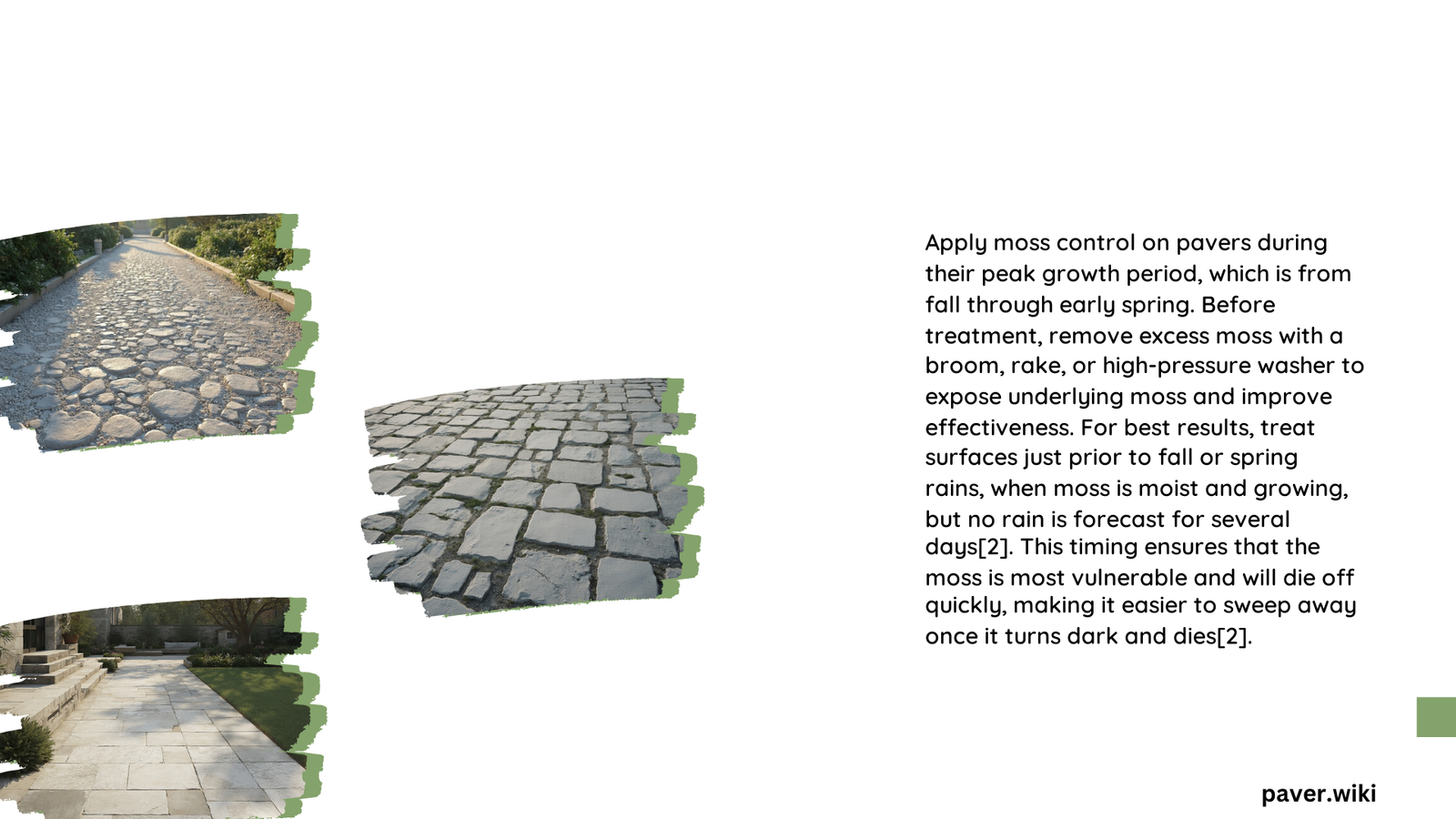Applying moss control on pavers is crucial for maintaining their appearance and longevity. The optimal time for moss control varies depending on seasonal factors and weather conditions. Generally, winter and early spring are considered the best periods for moss treatment, as moss grows more actively during these seasons. Ideal conditions include temperatures between 40°F and 75°F, with moist but not waterlogged moss. Regular maintenance and proper techniques are essential for effective moss control on pavers.
When is the Best Season to Apply Moss Control on Pavers?
The timing of moss control application on pavers is critical for its effectiveness. Here’s a breakdown of the best seasons:
- Winter
- Often considered the optimal time
- Moss is most active during this season
-
Better results and cost-effective in the long run
-
Early Spring
- Excellent time to start treatment
- Begin as soon as weather warms up
-
Prevents moss from becoming deeply rooted
-
Late Fall
- Good time for preventive treatment
-
Prepares pavers for winter moss growth
-
Summer
- Less ideal due to dry conditions
- Can be effective if moss remains moist
What Weather Conditions are Ideal for Moss Control Application?

The effectiveness of moss control products depends significantly on weather conditions:
- Temperature Range: 40°F to 75°F (4°C to 24°C)
- Humidity: Moist conditions, but not water-soaked
- Rainfall: Avoid application during or shortly before rain
- Sunlight: Overcast days are preferable to prevent quick drying
| Weather Factor | Ideal Condition | Reason |
|---|---|---|
| Temperature | 40°F – 75°F | Optimal for product effectiveness |
| Humidity | Moist | Moss actively absorbs treatment |
| Rainfall | Dry, no imminent rain | Prevents product washoff |
| Sunlight | Overcast | Prevents rapid drying of product |
How Often Should Moss Control be Applied to Pavers?
The frequency of moss control application depends on several factors:
- Climate: More frequent in wet, shaded areas
- Paver Type: Some materials are more prone to moss growth
- Product Used: Longevity varies by treatment type
For regular maintenance:
– Apply several times per season
– Some products can be effective for 6-9 months
What are the Best Techniques for Applying Moss Control on Pavers?
Effective moss control involves a combination of techniques:
- Manual Removal
- Use a stiff or wire broom on dry days
-
Dislodge moss before it roots deeply
-
Chemical Treatments
- 10-15% bleach solution
- White vinegar (use cautiously)
-
Commercial moss control products
-
Pressure Washing
- Effective but requires care
-
Use low pressure to avoid damaging pavers
-
Prevention Techniques
- Improve drainage in the area
- Trim overhanging vegetation for more sunlight
What Challenges Might Arise When Applying Moss Control on Pavers?
Several challenges can occur during moss control application:
- Sand Displacement
- High-pressure cleaning can remove joint sand
-
Requires additional maintenance to replace sand
-
Surface Damage
- Certain chemicals may harm specific paver types
-
High-pressure washing can erode softer pavers
-
Moisture Accumulation
- Poor drainage leads to quick moss regrowth
-
Address underlying moisture issues for long-term control
-
Environmental Concerns
- Some chemical treatments may affect surrounding plants
- Consider eco-friendly alternatives when possible
How Does Paver Material Affect Moss Control Application Timing?
Different paver materials may require adjusted timing for moss control:
- Concrete Pavers
- Generally resilient to most treatments
-
Can be treated year-round with proper precautions
-
Natural Stone Pavers
- More sensitive to harsh chemicals
-
Best treated in milder weather to avoid thermal shock
-
Clay Brick Pavers
- Porous nature may require more frequent treatment
-
Avoid freezing temperatures to prevent damage
-
Permeable Pavers
- Require special care to maintain drainage properties
- Best treated when dry to avoid clogging pores
What Preventive Measures Can Reduce the Need for Frequent Moss Control?
Implementing preventive measures can significantly reduce moss growth:
- Improve Drainage
- Ensure proper slope and runoff
-
Install adequate drainage systems
-
Increase Sunlight Exposure
- Trim overhanging branches
-
Remove obstacles blocking sunlight
-
Regular Cleaning
- Sweep or blow debris regularly
-
Remove organic matter that can feed moss
-
Seal Pavers
- Apply appropriate sealants
-
Creates a barrier against moisture and spores
-
Adjust Soil pH
- Moss prefers acidic conditions
- Slightly alkaline soil can deter growth
By understanding the optimal timing, techniques, and challenges associated with moss control on pavers, homeowners and professionals can maintain beautiful, moss-free outdoor spaces. Regular maintenance and preventive measures are key to long-term success in controlling moss growth on pavers.
References:
1. RooftoFloor Maintenance
2. The Paver Savers
3. Oregon State University
